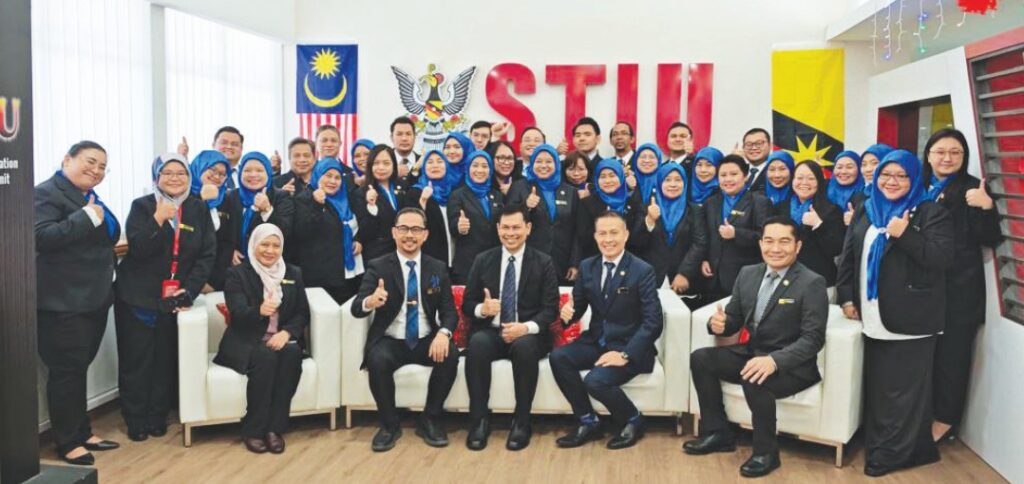KUCHING: Sarawak is enhancing its productivity and economic resilience through the flagship initiatives of the Malaysia Productivity Corporation (MPC), including the Reformasi Kerenah Birokrasi (RKB), a hub-and-spoke model, and the Premier of Sarawak Industry Excellence Award (PSIEA).
Measurable Outcomes from Productivity Initiatives
According to MPC Sarawak Director Mazlina Shafi’i, these initiatives are yielding significant results, such as RM500 million in regulatory cost savings, expedited approvals, increased satisfaction levels, and broader participation from SMEs in performance benchmarking.
State’s Economic Ambitions
“These efforts align with our goal to double the state GDP by 2030 and create a more efficient, competitive, and innovation-driven economy,” she stated, emphasizing the need for comprehensive reforms that benefit both business and government performance to ensure sustainable productivity gains.
Focus on Private Sector Growth
Highlighting the private sector as the backbone of Sarawak’s economy, contributing 91% to employment and 90.8% to economic output, Mazlina noted that a supportive environment is essential for unlocking this potential. The International Institute for Management Development’s (IMD) World Competitiveness Yearbook 2024 revealed a drop in Malaysia’s competitiveness to 34th out of 67 countries, largely due to decreased efficiency in business and government.
Implementing the RKB Initiative
In response, MPC introduced the Reformasi Kerenah Birokrasi (RKB) using a Whole-of-Government approach aimed at reducing bureaucratic obstacles, modernizing delivery systems, and enhancing productivity within the public sector.
Hub-and-Spoke Model Enhancing Efficiency
Mazlina explained that the hub-and-spoke model positions MPC as the central ‘hub’ that sets frameworks and facilitates reforms, while various ministries, agencies, and local authorities act as ‘spokes’ responsible for executing the required changes. This approach has resulted in a 30% faster approval process and a notable 25% increase in satisfaction levels, significantly reducing compliance costs for businesses that previously relied on external runners to handle forms and permits.
Recognizing Excellence through PSIEA
Alongside the RKB, the MPC Sarawak has launched the PSIEA to assist companies in evaluating their performance, strengthening operations, and gaining recognition. The PSIEA, which occurs every two years, is currently accepting submissions for its 2025 cycle until June 20, 2025, with no participation fee required.
Support for SMEs and Digital Transformation
To facilitate SMEs in applying for the award, MPC will conduct capacity-building workshops starting in mid-May. These workshops aim to support smaller businesses in preparing submissions based on the Malaysia Business Excellence Framework (MBEF), which assesses seven key areas, including leadership and customer focus. Furthermore, PSIEA is connected to digital initiatives such as MyReskill IoT and AI for Productivity, ensuring that small and medium enterprises embrace new technologies to enhance their competitiveness.
A Shared Vision for the Future
Mazlina emphasized that both the RKB and PSIEA represent a strategic vision for integrating productivity into the core of Sarawak’s economic and institutional systems. “True growth occurs when both government efficiency and business competitiveness align,” she asserted. The focus on productivity is not merely a temporary initiative but rather an essential ongoing effort rooted in fostering systemic improvements across the entire state.
Sarawak’s Drive for Economic Excellence
Sarawak is taking significant strides toward enhancing productivity and economic resilience through the Malaysia Productivity Corporation’s (MPC) flagship initiatives. Key programs such as Reformasi Kerenah Birokrasi (RKB), the hub-and-spoke model, and the Premier of Sarawak Industry Excellence Award (PSIEA) are at the forefront of this transformative journey.
Impact of the Initiatives
According to the MPC Sarawak Director, effective reforms are yielding tangible outcomes, including approximately RM500 million in regulatory cost savings and quicker approval processes. These measures also contribute to heightened satisfaction levels among businesses and broadened participation from small and medium enterprises (SMEs) in performance benchmarking.
Alignment with Economic Goals
The initiatives align closely with Sarawak’s aim to double its GDP by 2030, fostering a more competitive and innovation-driven economy. It is crucial that the reforms support both business and governmental performance to ensure sustained productivity improvements.
Whole-of-Government Approach
In a bid to modernize its bureaucratic processes, the MPC has adopted a Whole-of-Government approach with the RKB program, focusing on reducing red tape and innovating public sector delivery systems. Utilizing a structured hub-and-spoke model, MPC acts as the central hub while various ministries and agencies execute reforms within their jurisdictions.
Efficiency and Compliance
This collaborative model has reportedly expedited approval processes by 30% and increased satisfaction levels by 25%. Furthermore, it has successfully minimized compliance costs for businesses, particularly those that previously spent resources on managing permits through third parties. Nationally, it has resulted in over RM500 million in annual government cost savings.
Recognition of Local Businesses
Parallel to these initiatives, the PSIEA aims to help companies assess their performance and strengthen operational capabilities. Open for submissions until June 20, 2025, this award seeks to recognize businesses of all sizes, ensuring that even small enterprises can document and improve their practices through structured evaluation.
Support for SMEs through Training
To assist SMEs in participating, MPC will initiate capacity-building workshops starting mid-May. These workshops will provide practical support in preparing submissions based on the Malaysia Business Excellence Framework (MBEF), focusing on critical areas such as leadership and customer focus.
Future Economic Transformation
Mazlina underscores that both RKB and PSIEA are integral to a long-term strategy for embedding productivity and excellence into Sarawak’s economic framework. The ongoing commitment to reform will not only uplift individual businesses but will also contribute to a foundation for sustainable economic development in the state.


